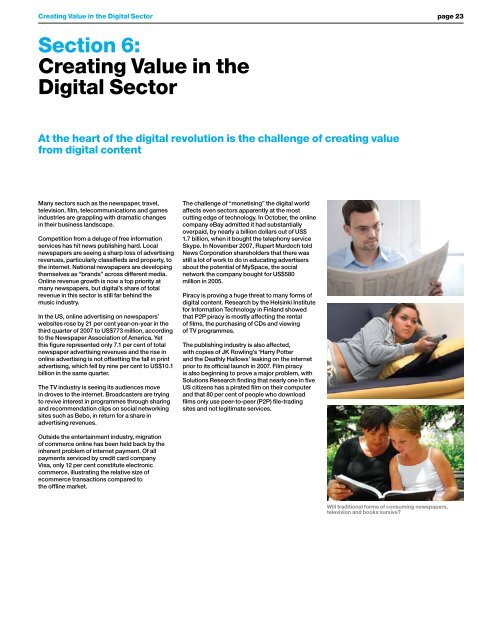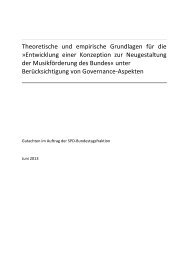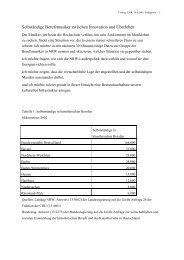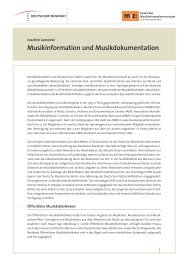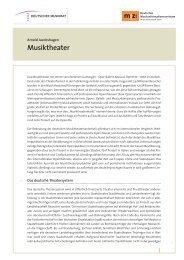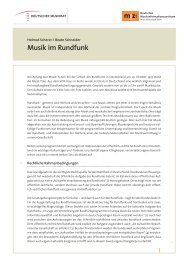You also want an ePaper? Increase the reach of your titles
YUMPU automatically turns print PDFs into web optimized ePapers that Google loves.
Creating Value in the <strong>Digital</strong> Sector page 23<br />
Section 6:<br />
Creating Value in the<br />
<strong>Digital</strong> Sector<br />
At the heart of the digital revolution is the challenge of creating value<br />
from digital content<br />
Many sectors such as the newspaper, travel,<br />
television, film, telecommunications and games<br />
industries are grappling with dramatic changes<br />
in their business landscape.<br />
Competition from a deluge of free information<br />
services has hit news publishing hard. Local<br />
newspapers are seeing a sharp loss of advertising<br />
revenues, particularly classifieds and property, to<br />
the internet. National newspapers are developing<br />
themselves as “brands” across different media.<br />
Online revenue growth is now a top priority at<br />
many newspapers, but digital’s share of total<br />
revenue in this sector is still far behind the<br />
music industry.<br />
In the US, online advertising on newspapers’<br />
websites rose by 21 per cent year-on-year in the<br />
third quarter of 2007 to US$773 million, according<br />
to the Newspaper Association of America. Yet<br />
this figure represented only 7.1 per cent of total<br />
newspaper advertising revenues and the rise in<br />
online advertising is not offsetting the fall in print<br />
advertising, which fell by nine per cent to US$10.1<br />
billion in the same quarter.<br />
The TV industry is seeing its audiences move<br />
in droves to the internet. Broadcasters are trying<br />
to revive interest in programmes through sharing<br />
and recommendation clips on social networking<br />
sites such as Bebo, in return for a share in<br />
advertising revenues.<br />
Outside the entertainment industry, migration<br />
of commerce online has been held back by the<br />
inherent problem of internet payment. Of all<br />
payments serviced by credit card company<br />
Visa, only 12 per cent constitute electronic<br />
commerce, illustrating the relative size of<br />
ecommerce transactions compared to<br />
the offline market.<br />
The challenge of “monetising” the digital world<br />
affects even sectors apparently at the most<br />
cutting edge of technology. In October, the online<br />
company eBay admitted it had substantially<br />
overpaid, by nearly a billion dollars out of US$<br />
1.7 billion, when it bought the telephony service<br />
Skype. In November 2007, Rupert Murdoch told<br />
News Corporation shareholders that there was<br />
still a lot of work to do in educating advertisers<br />
about the potential of MySpace, the social<br />
network the company bought for US$580<br />
million in 2005.<br />
Piracy is proving a huge threat to many forms of<br />
digital content. Research by the Helsinki Institute<br />
for Information Technology in Finland showed<br />
that P2P piracy is mostly affecting the rental<br />
of films, the purchasing of CDs and viewing<br />
of TV programmes.<br />
The publishing industry is also affected,<br />
with copies of JK Rowling’s ‘Harry Potter<br />
and the Deathly Hallows’ leaking on the internet<br />
prior to its official launch in 2007. Film piracy<br />
is also beginning to prove a major problem, with<br />
Solutions Research finding that nearly one in five<br />
US citizens has a pirated film on their computer<br />
and that 80 per cent of people who download<br />
films only use peer-to-peer (P2P) file-trading<br />
sites and not legitimate services.<br />
Will traditional forms of consuming newspapers,<br />
television and books survive?


